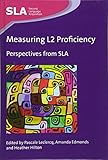Measuring L2 Proficiency : Perspectives from SLA / ed. by Pascale Leclercq, Amanda Edmonds, Heather Hilton.
Material type: TextSeries: Second Language AcquisitionPublisher: Bristol ; Blue Ridge Summit : Multilingual Matters, [2014]Copyright date: ©2014Description: 1 online resource (264 p.)Content type:
TextSeries: Second Language AcquisitionPublisher: Bristol ; Blue Ridge Summit : Multilingual Matters, [2014]Copyright date: ©2014Description: 1 online resource (264 p.)Content type: - 9781783092284
- 9781783092291
- Language and languages -- Research -- Methodology
- Literacy -- Research -- Methodology
- Second language acquisition -- Evaluation
- Second language acquisition -- Research -- Methodology
- LANGUAGE ARTS & DISCIPLINES / Linguistics / Psycholinguistics
- CEFR
- Common European Framework of Reference for Languages
- L2 assessment
- L2 attainment
- L2 proficiency
- SLA
- Second Language Acquisition
- assessment in language learning
- assessment of second language
- how to assess L2
- measuring L2 proficiency
- psycholinguistics
- second language proficiency
- sociolinguistics
- 401.93
- P118 .M396 2014
- P118 .M396 2014
- online - DeGruyter
- Issued also in print.
| Item type | Current library | Call number | URL | Status | Notes | Barcode | |
|---|---|---|---|---|---|---|---|
 eBook
eBook
|
Biblioteca "Angelicum" Pont. Univ. S.Tommaso d'Aquino Nuvola online | online - DeGruyter (Browse shelf(Opens below)) | Online access | Not for loan (Accesso limitato) | Accesso per gli utenti autorizzati / Access for authorized users | (dgr)9781783092291 |
Frontmatter -- Contents -- Contributors -- Acknowledgments -- Preface -- Introduction -- 1. How to Assess L2 Proficiency? An Overview of Proficiency Assessment Research -- Part 1: General Considerations for L2 Assessment -- 2. Oral Fluency and Spoken Proficiency: Considerations for Research and Testing -- 3. Multiple Assessments of Oral Proficiency: Evidence from a Collaborative Platform -- 4. Using Learner Corpora for Testing and Assessing L2 Proficiency -- Part 2: Language Processing and L2 Proficiency -- 5. Listening Comprehension: Processing Demands and Assessment Issues -- 6. A Psycholinguistic Measurement of Second Language Proficiency: The Coefficient of Variation -- 7. Evaluating the Workings of Bilingual Memory with a Translation Recognition Task -- Part 3: Focused Assessment Instruments -- 8. 'Repeat as Much as You Can': Elicited Imitation as a Measure of Oral Proficiency in L2 French -- 9. Exploring the Acquisition of the French Subjunctive: Local Syntactic Context or Oral Proficiency? -- 10. Testing L2 Listening Proficiency: Reviewing Standardized Tests Within a Competence-Based Framework -- 11. Assessing Language Dominance with the Bilingual Language Profile -- Epilogue -- Index
restricted access online access with authorization star
http://purl.org/coar/access_right/c_16ec
The creation of the Common European Framework of Reference for Languages (CEFR) has given rise to interest and debate among policy makers, testers, teachers and researchers alike in the reliability and feasibility of the assessment of second language (L2) proficiency. This volume brings together concrete ideas on identifying and measuring L2 proficiency from different branches of SLA research (psycholinguistic, sociolinguistic, corpus-based, applied linguistics) to contribute to a deeper understanding of what it means to be proficient in an L2. The chapters introduce a wide range of tools that are innovative, reliable, and easy-to-use for the evaluation of learners' language level with respect to both productive and receptive skills and provide a variety of answers to the question of how to assess L2 proficiency in a valid, reliable and practical manner. The collection will therefore inspire language teachers, teacher trainers and language testing specialists and help them adapt their assessment practices when necessary, and will also be a valuable resource for postgraduate students and researchers.
Issued also in print.
Mode of access: Internet via World Wide Web.
In English.
Description based on online resource; title from PDF title page (publisher's Web site, viewed 24. Apr 2022)


